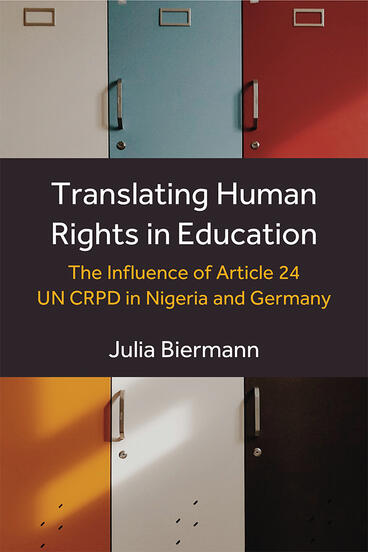Translating Human Rights in Education
The Influence of Article 24 UN CRPD in Nigeria and Germany
How the UN's right to inclusive education has resulted in school segregation for disabled students
Description
The 2006 United Nations Convention on the Rights of Persons with Disabilities (UN CRPD) is the first human rights treaty to explicitly acknowledge the right to education for persons with disabilities. In order to realize this right, the convention’s Article 24 mandates state parties to ensure inclusive education systems that overcome outright exclusion as well as segregation in special education settings. Despite this major global policy change to tackle the discriminations persons with disabilities face in education, this has yet to take effect in most school systems worldwide.
Focusing on the factors undermining the realization of disability rights in education, Julia Biermann probes current meanings of inclusive education in two contrasting yet equally challenged state parties to the UN CRPD: Nigeria, whose school system overtly excludes disabled children, and Germany, where this group primarily learns in special schools. In both countries, policy actors aim to realize the right to inclusive education by segregating students with disabilities into special education settings. In Nigeria, this demand arises from the glaring lack of such a system. In Germany, conversely, from its extraordinary long-term institutionalization. This act of diverting from the principles embodied in Article 24 is based on the steadfast and shared belief that school systems, which place students into special education, have an innate advantage in realizing the right to education for persons with disabilities. Accordingly, inclusion emerges to be an evolutionary and linear process of educational expansion that depends on institutionalized special education, not a right of persons with disabilities to be realized in local schools on an equal basis with others. This book proposes a refined human rights model of disability in education that shifts the analytical focus toward the global politics of formal mass schooling as a space where discrimination is sustained.
Julia Biermann is Assistant Professor for Education Studies at the University of Innsbruck.
Reviews
“This book constitutes an original and scholarly examination of two countries, Nigeria and Germany, in which attempts to produce an inclusive education system in accordance with the UN Convention on the Rights of Persons with Disabilities has resulted in a ‘specialeducationalisation of inclusion’ in both countries. Nigeria, struggling with a post-colonial, diverse, under resourced system simply excludes eight million children from basic education. Paradoxically the country needs to develop a system for those with disabilities and special educational needs in order to include children. Germany, with a long history of segregated special schooling struggles with political and practitioner objections to changing a system based on segregation by ability, but claims to be inclusive. Both countries indicate the difficulties of incorporating the moral and legal human rights embodied in the UN Convention and offering equal rights and participation in an inclusive education system. The book is an important contribution to understanding how education systems in the global south and north could develop and offer genuine inclusion and guarantee the human rights of all young people.”
—Emeritus Professor Sally Tomlinson, Honorary Fellow in the Department of Education, University of Oxford
- Sally Tomlinson
"This book has national and international foci and implications that make it a must-read for researchers, educators, and development planners at all levels of special education."
—Festus E. Obiakor, Sunny Educational Consulting
- Festus Obiakor

